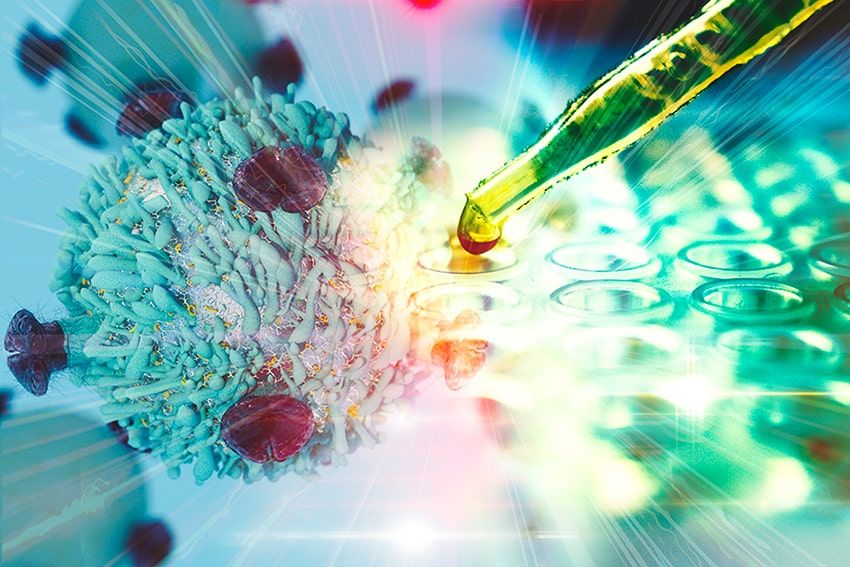
The George Washington University (GW) Cancer Center recently announced the selection of the 2021 GW Cancer Center Awards, recognizing excellence in research, mentorship, and early career contributions.
The GW Cancer Center Outstanding Scientist Award was presented to Yuan Zhu, PhD, professor of pediatrics at the GW School of Medicine and Health Sciences (SMHS) and Children’s National Hospital. The award is presented to faculty members who make a noteworthy contribution in the areas of basic science, clinical science, translational science, or population science.
In his nomination Zhu was cited for his contributions to the understanding of the mechanisms underlying the development of tumors and altered brain development arising in the setting of the inherited condition neurofibromatosis type 1 (NF1). “Throughout his career, Dr. Zhu has had a remarkable consistency of focus in his scholarly work, where he has sought to advance new molecular and mechanistic insights to understand the biological basis of NF1 and the cancers arising in individuals affected by this genetic disease.”
Maho Shibata, PhD, assistant professor of anatomy and cell biology, was selected for the GW Cancer Center Award for Mentorship Excellence. This award goes to faculty members who inspire careers in cancer care, research, or education, provide timely, ongoing individualized feedback, servs as a role model, provide opportunities and resources for mentees to grow, strive for excellence, and achieve their full potential.
In nominating of Shibata, an undergraduate fellow said, “Dr. Shibata provided me with the unique opportunity to begin my own research project in her lab. As I began studying the identities and role of macrophages during prostate development and tumorigenesis… with the support system of Dr. Shibata… I quickly realized that I possessed the necessary backing to be successful in the lab.”
The GW Cancer Center Junior Faculty Research Award was presented to Huadong Pei, PhD, assistant professor of biochemistry and molecular medicine. This award recognizes an assistant professor who demonstrates significant achievement and impact in cancer research, particularly outstanding capability and exceptional promise for significant future achievements and potential value to the research mission of the GW Cancer Center.
Rong Li, PhD, chair of the Department of Biochemistry and Molecular Medicine and Ross Professor of Basic Science Research described Pei as “a rising star in his research fields and a highly valuable member of the local scientific community at the GW Cancer Center.” He added. “Dr. Pei’s remarkable accomplishments so far are evidenced by publications in high-impact journals including Nature, Cancer Cell, Molecular Cell, Cell Rep, Nature Communications, and Cancer Research.”
In the spring, the GW Cancer Center hosted the 5th Annual GW Cancer Center Scientific Retreat. This year’s event featured the keynote address, “Topoisomerases and Their Relevance for Cancer Biology and Medicine,” by Yves Pommier, MD, PhD, chief of the Developmental Therapeutics Branch and head of the Molecular Pharmacology Group at the Center for Cancer Research, National Cancer Institute.
Following the address, participants broke out into six disease-focused sessions on breast cancer, gastrointestinal malignancies, neuro-oncology, prostate cancer, tobacco use and related cancers, and virus-associated malignancies. In the afternoon, attendees followed two tracks — basic and translational research, and population science and community engagement — for a series of talks and research updates.&
Nada Jabado, MD, PhD, professor of pediatrics and human genetics at the Research Institute of the McGill University Health Center, presented “The Peter Pan Syndrome: Stalled Development at the Root of Oncohistone-Mediate Tumor” for the basic and translational research group. For those attending the population science and community engagement sessions, Shoba Srinivasan, PhD, senior advisor for health disparities, and office director of the Division of Cancer Control and Population Sciences at the National Cancer Institute, presented “Serving Communities — Rethinking Methodological Assumptions?”
At the conclusion of the retreat, trainee awards were presented for best oral presentation and poster presentation. Nicole Bonan, MS, PhD candidate, received the top prize for Best Oral Presentation for her talk, “Developing an NK Cell-based Immunotherapy To Treat Solid Tumors.”
Postdoctoral researcher Bogang Wu, PhD, was second in the category for “Genetic Ablation of Adipocyte PD-L1 Reduces Tumor Growth But Accentuates Obesity-Associated Inflammation.”
Yihan Peng, PhD, a postdoctoral researcher earned first place in the Best Poster category for “The Role of Histidine Phosphorylation for Alkylated DNA Repair and Cancer Chemotherapy.”
Second place went to research assistant Andrew Pletcher, BS ’21, for his poster, “Macrophage Heterogeneity within the Developing Prostate and Prostate Tumor Tissue.”
PhD candidate Debbie Ledezma, earned third place for her poster, “Interstitial Photothermal Therapy as a Novel Approach To Treat Neuroblastoma.”


